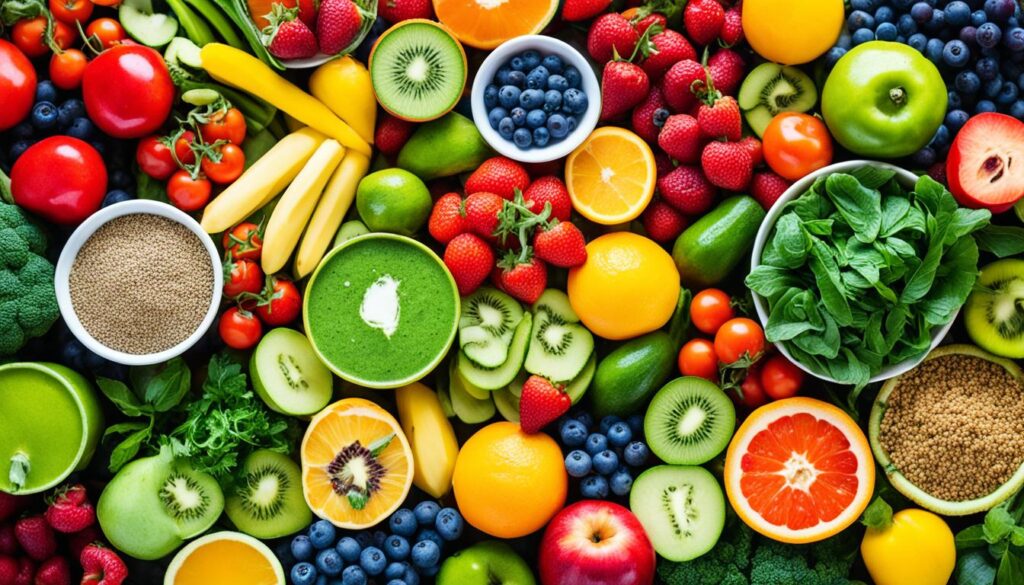Are you curious about the potential benefits of a plant-based diet, but unsure where to start? Look no further! This comprehensive guide will explore the key advantages of embracing a1 whole-food, plant-based lifestyle and provide practical tips to help you transition seamlessly1. From easy weight management to reduced risk of chronic diseases, discover why a1 plant-based diet could be the key to improving your overall health and well-being.
Key Takeaways
- A whole-food, plant-based diet is based on consuming natural, unprocessed, plant-based foods like fruits, vegetables, whole grains, legumes, nuts, and seeds.
- Plant-based diets have been shown to offer numerous health benefits, including easy weight management, reduced risk of heart disease, diabetes, and certain cancers123.
- Adopting a plant-based lifestyle can also have a positive impact on the environment, reduce animal suffering, and save you money on groceries2.
- Gradual transition to a plant-based diet, such as going meatless one day per week, can be a beneficial approach1.
- Proper planning is important to ensure adequate intake of essential nutrients like calcium, vitamin D, vitamin B-12, iron, zinc, and iodine on a vegan or vegetarian diet1.
What Is a Whole-Food, Plant-Based Diet?
A whole-food, plant-based diet is centered around eating natural, minimally processed plant-based foods4. The key principles include focusing on whole, unrefined, or minimally refined ingredients rather than highly processed foods, and prioritizing plant-based sources like fruits, vegetables, whole grains, legumes, nuts, and seeds.
Principles of a Whole-Food, Plant-Based Diet
The core principles of a whole-food, plant-based diet are simple yet powerful. This approach emphasizes eating a variety of fresh, frozen, or canned plant-based foods in their whole, natural state. It avoids animal-based products like meat, dairy, eggs, and honey, as well as highly processed, refined, and packaged foods5.
The Five Food Groups
On a whole-food, plant-based diet, the five main food groups are:
- Fruits: Any type of fresh, frozen, or canned fruit.
- Vegetables: A wide variety of vegetables, both starchy and non-starchy.
- Whole grains: Whole wheat, brown rice, quinoa, oats, and other unrefined grains.
- Legumes: Beans, lentils, peas, and other pulses.
- Nuts and seeds: In moderation, as they are calorie-dense.
By focusing on these whole, plant-based foods, individuals can enjoy a nutritious, balanced, and satisfying diet6.
Health Benefits of a Plant-Based Diet
Embracing a plant-based diet can unlock a multitude of remarkable health benefits. Research shows that people who eat a plant-based diet tend to be leaner than those who don’t7. This is because whole plant-based foods are low in calories yet high in fiber, which helps you feel full and satisfied7. The low calorie density of plant-based foods allows you to eat larger portions without exceeding your calorie needs7.
Easy Weight Management
In addition to weight loss, a plant-based diet can also support long-term weight management. Studies have found that plant-based diets are highly effective for weight loss and maintenance7. By filling your plate with nutrient-dense, high-fiber foods, you can curb hunger and cravings, making it easier to stick to a healthy eating plan.
Improve Heart Health
A whole-food, plant-based diet is an extremely effective way to promote cardiovascular health and prevent, halt, and even reverse heart disease7. Plant-based diets are low in the harmful saturated fat and cholesterol found in animal-based foods, which can raise blood cholesterol levels and lead to plaque buildup in the arteries7. Additionally, the high fiber, antioxidants, and other beneficial plant compounds in a plant-based diet help regulate blood pressure and improve overall heart function7.
Numerous studies have shown that consuming less meat decreases the risk of heart disease, stroke, obesity, high blood pressure, high cholesterol, type 2 diabetes, and many cancers8. Processed meats, like deli meat, bacon, and sausage, often contain high sodium and additives which should be limited8. Eating primarily nutrient-dense plant-based foods like vegetables, fruits, whole grains, beans, legumes, and nuts is associated with a lower risk of death from cardiovascular diseases8.
Plant-based diets are linked to a 22% lower risk of ischemic heart disease in vegetarians and a 13% lower risk in pescatarians compared to regular meat eaters9. Lower levels of the inflammatory marker interleukin-6 were observed in individuals with overweight or obesity after following a plant-based diet for 4 weeks9.
A whole-food, plant-based diet is an extremely effective way to promote cardiovascular health and prevent, halt, and even reverse heart disease.
Plant-Based Diet Prevents Chronic Diseases
Numerous studies have found that plant-based diets can prevent, control, and even reverse many chronic diseases10. These include type 2 diabetes, certain types of cancer, and other major illnesses10. The combination of a nutrient-dense, low-calorie, and anti-inflammatory plant-based diet can significantly reduce the risk of developing these chronic conditions10. Many people report improved health outcomes, increased energy, and reduced inflammation after transitioning to a whole-food, plant-based lifestyle10.
A plant-based diet typically includes fruits, vegetables, nuts, seeds, whole grains, and legumes10. Research supports that plant-based diets can prevent and treat chronic diseases and reduce reliance on medications10. Various plant-based protein sources include tofu, lentils, beans, nuts, seeds, and quinoa10. It is recommended that at least 2/3 of each meal consist of plant-based foods when starting a plant-based diet10. The transition to a plant-based diet can involve gradually reducing the consumption of animal products to one serving a day10. No plants need to be excluded from a plant-based diet according to the information provided10.
A 2015 review stated that people following a plant-based diet for weight loss lost an average of 7.5 to 10 pounds11. A 2015 randomized controlled trial showed that individuals on vegan diets lost 7.5% of their baseline body weight, outperforming other diet groups that lost just over 3%11. Plant-based eating can support weight management, reduce medication needs, lower the risk of chronic diseases, and decrease heart disease deaths11.
Vegetarian and vegan diets are associated with a lower risk of heart disease and cancer12. Individuals following a flexitarian diet comprising whole foods may experience the best outcomes with a plant-based diet12. Vegetarian and vegan diets have shown positive effects on improving cardiometabolic risk factors, including elevated lipids, blood sugar, body weight, BMI, and inflammation12. Those on plant-based diets had a lower risk of ischemic heart disease, gastrointestinal cancers, and prostate cancers12. Following plant-based diets can reduce the risk of dying from cardiovascular disease12.
Plant-based diets have been found to reduce the risk of death compared to diets high in meat, refined grains, sugar, and salt12. Diets low in plant foods and high in meat are connected to a higher risk of death, whereas plant-based diets can reduce the risk of cardiovascular disease and cancer12. The association between vegetarian and vegan diets and reduced cardiometabolic risk factors is reported to be strong12. Plant-based diets, by excluding cholesterol and high levels of saturated fat commonly found in animal foods, may contribute to improvements in health12. Plant-based diets rich in vitamins, antioxidants, and fiber may help reduce the risk of chronic diseases12.
Incorporating more plant-based foods into the diet can be achieved by adding variety such as seeds like sesame, sunflower, chia, flax, hemp, and pumpkin, and whole grains like farro, quinoa, or wild rice to existing meals12.
Plant-Based Diet: Benefits and How to Get Started
Embracing a plant-based diet offers a multitude of benefits that extend far beyond personal health. In addition to the health benefits, a plant-based diet also has a lighter environmental footprint compared to diets high in animal products13. Raising animals for food is an incredibly inefficient use of resources, contributing significantly to greenhouse gas emissions, water usage, and land degradation13. By choosing a plant-based diet, you can dramatically reduce your personal environmental impact13. The financial benefits are also notable, as whole plant-based foods are generally more affordable than meat, dairy, and highly processed foods1314.
To get started on a plant-based diet, begin by gradually incorporating more whole, minimally processed plant-based foods into your meals. Focus on a variety of fruits, vegetables, whole grains, legumes, nuts, and seeds. Meal planning and advanced preparation can help make the transition easier and more sustainable14. With a little experimentation, you’ll discover delicious plant-based recipes that satisfy your cravings and nourish your body.
The advantages of a plant-based diet extend beyond personal health. By choosing a plant-based lifestyle, you can make a significant positive impact on the environment13. Livestock production is a major contributor to greenhouse gas emissions, water usage, and land degradation, and transitioning to a plant-based diet can dramatically reduce your carbon footprint13. Additionally, whole plant-based foods tend to be more affordable than meat, dairy, and highly processed options, making a plant-based diet a financially savvy choice1314.

The benefits of a plant-based diet are not just limited to personal health. By making the switch, you can also positively contribute to the health of our planet13. Reducing your consumption of animal-based products can significantly lower your carbon footprint and conserve valuable natural resources13. Moreover, plant-based whole foods are often more affordable than their meat and dairy counterparts, making a plant-based lifestyle financially accessible for many1314.
Embracing a plant-based diet is a powerful way to improve your health, support the environment, and enhance your financial well-being. Start by gradually incorporating more whole, minimally processed plant-based foods into your meals, and discover the many delicious and nourishing options available to you131514.
Cognitive Benefits of a Plant-Based Diet
Higher intakes of fruits and vegetables have been strongly associated with a reduced risk of cognitive decline and dementia16. Studies show that incorporating more plant-based foods in your diet can lower your risk of developing cognitive impairment by as much as 20 percent16. The antioxidants and other beneficial plant compounds found in a plant-based diet may also help reverse cognitive deficits and slow the progression of conditions like Alzheimer’s disease16.
Following a whole food, plant-based diet is linked to a decreased risk of cognitive decline and dementia17. The high fiber, vitamin, and mineral content of plant-based foods can contribute to improved brain health and cognitive function.
A growing body of research suggests that a plant-based diet may offer significant cognitive benefits. One study revealed that individuals following vegetarian diets had a lower risk of developing negative health outcomes compared to those on omnivorous diets18. Additionally, eating a plant-based diet has been associated with a reduced risk of cardiovascular disease, improved blood pressure, and better blood sugar control – all of which are factors that can impact cognitive function1718.
The antioxidants, anti-inflammatory properties, and neuroprotective compounds found in plant-based foods may help preserve cognitive abilities and even potentially reverse cognitive deficits16. By incorporating more fruits, vegetables, whole grains, legumes, nuts, and seeds into your diet, you can reap the cognitive benefits of a plant-based lifestyle.
“Adopting a plant-based diet has been linked to a lower risk of cognitive decline and a reduced likelihood of developing conditions like Alzheimer’s disease.”
Embracing a whole food, plant-based approach to eating can be a powerful tool in supporting brain health and cognitive function throughout your life. By making gradual changes to your diet and focusing on nutrient-dense plant-based foods, you can take steps to protect your cognitive abilities and potentially reduce your risk of developing debilitating conditions like dementia.
Plant-Based Diet for Diabetes Management
Mounting evidence suggests that plant-based diets can be highly beneficial for both preventing and managing type 2 diabetes. In fact, research has shown that a plant-based diet can help people better manage their diabetes and prevent complications like heart disease19. A study in Nutrition & Diabetes demonstrated significant improvements in BMI and cholesterol levels for individuals with chronic diseases like diabetes over a six-month follow-up period19.
Lower Risk of Type 2 Diabetes
One study found that plant-based diets were associated with an almost 50 percent reduction in the risk of type 2 diabetes compared to non-vegetarian diets19. The high fiber, low saturated fat, and antioxidant-rich nature of plant-based foods help regulate blood sugar levels and improve insulin sensitivity19. In fact, research has shown that a plant-based diet can help people better manage their diabetes and prevent complications like heart disease19.
Better Glycemic Control
For those already living with type 2 diabetes, plant-based diets have been shown to offer greater improvements in physical and emotional well-being compared to the diets recommended by diabetes associations19. By reducing saturated fat intake and increasing fiber consumption, plant-based diets can help individuals with diabetes better manage their blood sugar levels19. In fact, research has demonstrated that a whole-food, plant-based eating pattern can lead to significant improvements in blood glucose control and even diabetes remission in some cases20.

Incorporating more plant-based foods into one’s diet can be a powerful strategy for preventing and managing type 2 diabetes. From regulating blood sugar levels to improving overall health, the benefits of a plant-based approach are clear. By making gradual changes and focusing on nutrient-dense, whole-food options, individuals with diabetes can take meaningful steps towards better managing their condition and improving their quality of life.
Plant-Based Diet Reduces Cancer Risk
The American Cancer Society recommends a diet rich in plant-based foods, as ample evidence suggests that eating vegetables, fruits, and other plant-based foods may lower the risk of certain types of cancer21. In fact, research indicates that nearly 25% of overall cancer cases could be prevented with diet and nutrition alone21. Studies have found that vegetarian diets are associated with a significantly lower risk of gastrointestinal cancers, as well as a 22% lower risk of colon cancer compared to non-vegetarian diets21. The antioxidants, phytochemicals, and fiber found in plant-based foods may all contribute to the cancer-protective effects of a plant-based diet21.
Numerous studies have highlighted the benefits of a plant-based diet in reducing cancer risk22. Vegans have been shown to have the lowest rates of cancer among diet groups, followed by vegetarians21. Additionally, young women who consumed the most fiber-rich diets were 25% less likely to develop breast cancer later in life21. Furthermore, each 10 grams of daily fiber intake could reduce the risk of colorectal cancer by 10%21.
The cancer-fighting properties of a plant-based diet extend beyond just fiber22. A prostate cancer study demonstrated that a combination of tomato and broccoli in the diet was more effective at slowing tumor growth than either food alone21. Plant-based diets high in fiber have also been proven to reduce cancer risk and moderate insulin levels21.
| Diet Type | Cancer Risk Reduction |
|---|---|
| Vegan | Lowest cancer rates among diet groups |
| Vegetarian | Lower risk of gastrointestinal and colon cancer compared to non-vegetarians |
| Fiber-rich | 25% lower risk of breast cancer in young women |
| High in fiber | 10% reduction in colorectal cancer risk per 10 grams of daily fiber intake |
The evidence is clear: a plant-based diet can significantly reduce the risk of cancer22. By incorporating more fruits, vegetables, whole grains, and other plant-based foods into your diet, you can take an important step towards better health and reduced cancer risk23.
“A whole foods, plant-based diet has been associated with reduced cancer risk in comparison to a ketogenic diet, according to a review of studies by Drs. Shah and Iyengar.”22
Environmental Impact of Plant-Based Eating
The environmental impact of our dietary choices is a critical consideration in the fight against climate change. Raising animals for food is a major contributor to global greenhouse gas emissions, accounting for more emissions than the entire transportation sector24. A global shift toward a plant-based diet is widely recognized as necessary to combat the worst effects of climate change24. By eliminating the “middleman” of feeding crops to animals and instead consuming plant-based foods directly, a plant-based lifestyle can significantly reduce your carbon footprint24.
Reduced Greenhouse Gas Emissions
Shifting to plant-based diets rich in pulses, nuts, fruits, and vegetables could lead to substantial reductions in greenhouse gas emissions compared to current dietary patterns in most industrialized countries24. Vegan and vegetarian diets were associated with the greatest reductions in greenhouse-gas emissions24. A global shift to a plant-based diet could reduce mortality caused by food production by 10% and greenhouse gases by 70% by 205024. Animal products, both meat and dairy, in general require more resources and cause higher emissions than plant-based alternatives24. Cutting meat production is critical in reducing greenhouse gas emissions, with 57% of global emissions from food production coming from meat and dairy products24. Beef contributes the most global greenhouse gas emissions from food production, while just 29% come from plant-based foods24. Methane emissions of major meat and dairy corporations equal over 80% of the European Union’s methane footprint24. Swapping beef for beans could help the U.S. reach targeted greenhouse-gas emission reductions24. Eating 75 grams of beef daily for a year contributes to greenhouse gas emissions equivalent to driving a car 7,196 miles, while consuming 150 grams of beans daily for a year is equivalent to driving a car 93 miles24.
Water Conservation
Animal agriculture requires massive amounts of water, with the production of just one gallon of milk requiring 683 gallons of water25. In contrast, producing one pound of tofu only requires 244 gallons of water25. Switching to a plant-based diet can save an individual over 200,000 gallons of water per year by drastically reducing water-intensive animal products25.
Less Land Usage
Animal agriculture is the largest user of land globally, taking up 77% of the world’s farmland while providing only 18% of the world’s calories and 37% of total protein25. Transitioning to a plant-based diet would allow for a more efficient use of land, freeing up vast areas for wildlife habitats and carbon sequestration25.
Protecting Ocean Life
Commercial fishing practices, such as the use of longlines and drift nets, kill billions of unintended “bycatch” animals like sea turtles, sharks, and marine mammals each year26. By reducing or eliminating seafood consumption and choosing a plant-based diet, you can help protect the health of our oceans and the fragile marine ecosystems26.
The environmental benefits of a plant-based diet are clear. By making this lifestyle change, you can significantly reduce your carbon footprint, conserve water, and contribute to the protection of our planet’s resources and biodiversity242526.
Ethical Reasons for a Plant-Based Diet
Choosing a plant-based lifestyle can spare the lives of nearly 200 animals per year27. The vast majority of animals used for food are raised in brutal factory farm conditions, causing immense suffering27. By eliminating the consumption of meat, dairy, and eggs, you can take a stand against this cruel industry and promote more ethical and compassionate treatment of animals.
Reducing Animal Suffering
One of the most compelling reasons to adopt a plant-based diet is to reduce the immense suffering experienced by animals in the conventional food system. Each year, billions of animals are subjected to confinement, mutilation, and inhumane treatment on factory farms27. Switching to a plant-based diet can significantly reduce your contribution to this widespread animal cruelty and promote more ethical and sustainable food production practices.
The ethical argument for a plant-based diet extends beyond just the treatment of animals. It also encompasses the environmental impact of animal agriculture, which is a major contributor to climate change, water scarcity, and habitat destruction28. By choosing a plant-based lifestyle, you can reduce your carbon footprint, conserve natural resources, and protect the planet for future generations.
| Benefit | Description |
|---|---|
| Reduced Animal Suffering | A plant-based diet spares the lives of nearly 200 animals per year, as the majority of animals used for food are raised in brutal factory farm conditions, causing immense suffering27. |
| Environmental Sustainability | Animal agriculture is a major contributor to climate change, water scarcity, and habitat destruction. Adopting a plant-based diet can significantly reduce your carbon footprint and conserve natural resources28. |
| Improved Personal Health | A well-planned plant-based diet can provide a range of health benefits, including weight management, reduced risk of chronic diseases, and better glycemic control29. |
By choosing a plant-based lifestyle, you can not only spare the lives of countless animals and reduce your environmental impact but also improve your personal health through a nutrient-dense, whole-food diet29. It’s a powerful way to make a positive difference in the world and live more ethically and compassionately.
“The greatness of a nation and its moral progress can be judged by the way its animals are treated.” – Mahatma Gandhi
Getting Started on a Plant-Based Diet
Transitioning to a plant-based diet can be an exciting and rewarding journey, but it doesn’t have to happen overnight. In fact, experts suggest that a more gradual approach may be more sustainable for many people13. The key is to focus on adding in more plant-based whole foods, such as legumes, whole grains, and starchy vegetables, to your daily routine13. This can help you gradually reduce your intake of animal products and processed foods without feeling deprived.
Gradual Transition Tips
One effective strategy is to aim for adding around 1,000 calories of plant-based whole foods to your daily intake13. This can be achieved by swapping out meat, dairy, and eggs for plant-based alternatives like tofu, tempeh, or lentils1. Another tip is to focus on the big changes, such as replacing animal-based proteins with plant-based options13. These dramatic shifts can lead to the most noticeable health improvements, like better weight management and reduced risk of chronic diseases.
When transitioning to a plant-based diet, it’s important to plan your meals in advance and prepare food regularly30. This can help ensure that you have nutritious, plant-based options readily available, making it easier to stick to your new eating habits30. Additionally, being mindful of your protein intake and incorporating a variety of plant-based protein sources, such as legumes, whole grains, and soy products, can help you meet your daily protein needs1.
Remember, the transition to a plant-based diet is a journey, and it’s important to be patient and kind to yourself. Celebrate the small victories, and don’t be too hard on yourself if you occasionally slip up. With time and practice, a plant-based lifestyle can become a natural and rewarding part of your daily routine. Forks Over Knives, Mayo Clinic, and Parkview offer valuable resources to help you get started on your plant-based journey.
“The greatest weapon against stress is our ability to choose one thought over another.” – William James
Plant-Based Diet Recipes
Transitioning to a plant-based diet doesn’t mean you have to give up your favorite dishes. You can easily make plant-based versions of classic recipes by replacing animal-based ingredients with plant-based alternatives31. For example, you can substitute beans or lentils for ground meat in chili, make delicious veggie burgers, or transform stir-fries by making vegetables the star instead of chicken or beef31. Explore a wide range of whole-food, plant-based recipes to discover new favorite meals and make the transition to a plant-based lifestyle seamless and enjoyable31.
When it comes to transitioning to a plant-based diet, it’s important to be prepared and supported32. Many people feel compelled to overhaul their diet overnight after watching documentaries like The Game Changers, but it’s often more effective to make gradual changes32. Set one tangible goal at a time and surround yourself with plant-based foods to have many options available when hunger strikes32. View your new way of eating as an opening to a wide world of delicious and nutritious plant-based recipes.
To make the transition to a plant-based diet more seamless, consider stocking your pantry and fridge with essential plant-based ingredients33. Having a cheat sheet of plant-based protein options and go-to recipes can also help with meal planning33. Remember, it’s okay to start by going plant-based for just a few days a week and gradually increase33. The key is to find a sustainable approach that works for you and your lifestyle.

Discover a wealth of plant-based recipe resources to inspire your culinary journey. Organizations like Gen V, Peace Advocacy Network (PAN), and Veganuary offer vegan pledge programs and recipe guides to support individuals in transitioning to a plant-based lifestyle31. Additionally, websites like Food Empowerment Project and Forks Over Knives provide a wide range of plant-based recipe ideas, from classic comfort foods to innovative dishes31.
Remember, the transition to a plant-based diet doesn’t have to be all-or-nothing. With the right approach and a wealth of delicious recipe options, you can make the switch seamlessly and discover new favorite meals that nourish both your body and your taste buds333132.
Conclusion
In conclusion, a whole-food, plant-based diet offers an abundance of benefits for your health, the environment, and the welfare of animals. By eliminating or significantly reducing animal products and processed foods in favor of a diet rich in fruits, vegetables, whole grains, and legumes, you can improve your weight34, reduce your risk of chronic diseases3534, support the planet, and promote more ethical and sustainable food production.
Whether you choose to make the transition gradually or dive in headfirst, the time to start exploring the transformative power of a plant-based diet is now. Studies have shown that plant-based diets can lower the risk of all-cause mortality by 25 percent34, and that the highest consumers of fruits and vegetables have a 21 percent lower risk of stroke than those who consume the least34.
By embracing a whole-food, plant-based lifestyle, you can not only improve your own health but also contribute to a more sustainable and compassionate food system. With the abundance of plant-based options available today, it has never been easier to make the switch and reap the countless benefits of this transformative way of eating. So why wait? Start your plant-based journey today and experience the life-changing power of a diet that nourishes both your body and the planet353436.
FAQ
What is a whole-food, plant-based diet?
A whole-food, plant-based diet is centered around eating natural, minimally processed plant-based foods. The key principles include eating a variety of fruits, vegetables, whole grains, legumes, nuts, and seeds.
What are the five main food groups in a whole-food, plant-based diet?
The five main food groups are: 1) Fruits, 2) Vegetables (both starchy and non-starchy), 3) Whole grains, 4) Legumes, and 5) Nuts and seeds (in moderation).
How does a plant-based diet support easy weight management?
People who eat a plant-based diet tend to be leaner than those who don’t. Research shows that plant-based diets are highly effective for weight loss and maintenance, as whole plant-based foods are low in calories yet high in fiber, which helps you feel full and satisfied.
How can a plant-based diet improve heart health?
A whole-food, plant-based diet is an extremely effective way to promote cardiovascular health and prevent, halt, and even reverse heart disease. Plant-based diets are low in the harmful saturated fat and cholesterol found in animal-based foods, which can raise blood cholesterol levels and lead to plaque buildup in the arteries.
How can a plant-based diet prevent chronic diseases?
Numerous studies have found that plant-based diets can prevent, control, and even reverse many chronic diseases, including type 2 diabetes, certain types of cancer, and other major illnesses. The combination of a nutrient-dense, low-calorie, and anti-inflammatory plant-based diet can significantly reduce the risk of developing these chronic conditions.
How does a plant-based diet benefit the environment?
Raising animals for food is a major contributor to global greenhouse gas emissions, water usage, and land degradation. By choosing a plant-based diet, you can dramatically reduce your personal environmental impact and contribute to a more sustainable future.
How can a plant-based diet benefit cognitive function?
Higher intakes of fruits and vegetables have been strongly associated with a reduced risk of cognitive decline and dementia. Studies show that incorporating more plant-based foods in your diet can lower your risk of developing cognitive impairment by as much as 20 percent.
How can a plant-based diet help manage diabetes?
Plant-based diets have been shown to significantly lower the risk of developing type 2 diabetes and offer greater improvements in physical and emotional well-being for those already living with the condition. By reducing saturated fat intake and increasing fiber consumption, plant-based diets can help individuals with diabetes better manage their blood sugar levels.
How can a plant-based diet reduce the risk of cancer?
The American Cancer Society recommends a diet rich in plant-based foods, as ample evidence suggests that eating vegetables, fruits, and other plant-based foods may lower the risk of certain types of cancer. The antioxidants, phytochemicals, and fiber found in plant-based foods may all contribute to the cancer-protective effects.
How can a plant-based diet help reduce animal suffering?
Choosing a plant-based lifestyle can spare the lives of nearly 200 animals per year. The vast majority of animals used for food are raised in brutal factory farm conditions, causing immense suffering. By eliminating the consumption of meat, dairy, and eggs, you can take a stand against this cruel industry and promote more ethical and compassionate treatment of animals.
How can I gradually transition to a plant-based diet?
Experts recommend adding around 1,000 calories of plant-based whole foods, such as legumes, whole grains, and starchy vegetables, to your daily routine. This can help you gradually reduce your intake of animal products and processed foods without feeling deprived. Another tip is to focus on the big changes, like swapping meat, dairy, and eggs for whole plant-based foods.
Source Links
- How to start a plant-based diet – Mayo Clinic Press
- Plant-Based Diet: What It Is, Benefits, and Where To Start
- Whole-Foods, Plant-Based Diet: A Detailed Beginner’s Guide
- Whole-Food Plant-Based Diet Plan, Created by a Dietitian
- Whole Food, Plant-Based Diet Guide – Center for Nutrition Studies
- Whole food plant-based (WFPB) diet information | Doctors For Nutrition
- Plant-Based Nutrition: Good for You, Good for the Planet
- How does Plant-Forward (Plant-Based) Eating Benefit Your Health?
- Plant-Based Diet: What It Is, Benefits, and Where To Start
- What is a plant-based diet, and is it healthy?
- A plant-based diet beginner’s guide, from health benefits to foods to eat
- Heart Disease: Plant-Based Diets Best for Lowering Risk
- The Beginner’s Guide to a Whole-Food, Plant-Based Diet
- Plant-Based Diet Tips for Beginners
- Plant-Based Diet for Beginners: Your Guide to Getting Started
- The effects of plant-based diets on the body and the brain: a systematic review
- Beginner’s Guide to a Mostly Plant-Based Diet – Plant Based Pantry
- The Health Benefits of Eating a Plant-Based Diet and How to Get Started
- Can You Follow a Plant-Based Diet if You Have Diabetes? Here’s What You Need to Know
- Diabetes remission: Whole-food, plant-based diet may help
- Using diet to lower risk of cancer
- Research Shows Plant-Based Diets Are Better Than Ketogenic Diets for Cancer Risk and Long-Term Health
- The Impact of Plant-Based Dietary Patterns on Cancer-Related Outcomes: A Rapid Review and Meta-Analysis
- A Vegan Diet: Eating for the Environment
- Plant-Based Dietary Patterns for Human and Planetary Health
- Happy Earth Month: How Eating Plant-Based Can Have a Positive Impact on the Environment
- Nutritional Update for Physicians: Plant-Based Diets
- A Look at Plant-Based Diets
- Health Benefits of a Vegan Diet
- Transitioning to a plant-based diet – tips and tricks | Parkview Health
- Vegan Diet 101: Benefits and Resources to Get Started
- Making it Easy: Plant-Based Eating for Beginners | The Game Changers
- Your Step-By-Step Guide to Going Plant-Based
- 9 Scientific Benefits of Following a Plant-Based Diet
- The Benefits of Plant-Based Nutrition
- A Comprehensive Review of the Benefits of and the Barriers to the Switch to a Plant-Based Diet


